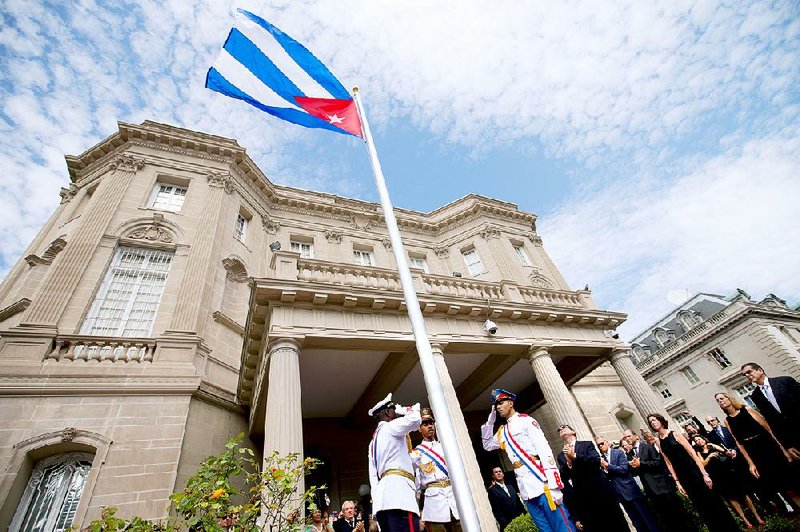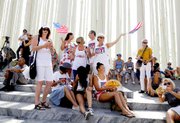WASHINGTON -- A diplomatic freeze that stretched back more than five decades, outlasting the Cold War and nine U.S. presidencies, officially ended Monday as Cuba and the United States reopened embassies.
The Cuban flag was raised over the island nation's diplomatic headquarters in Washington in a ceremony attended by Cuban Foreign Minister Bruno Rodriguez. He was to meet later in the day with Secretary of State John Kerry, who will travel to Havana for a flag-raising ceremony at the U.S. embassy there on Aug. 14, according to a U.S. official who discussed the plans on condition of anonymity.
Crowds thronged a block-length stretch of sidewalk outside the mansion in downtown Washington that had been serving as Cuba's interests section. They waved signs, sang Cuba's national anthem and chanted, in an atmosphere that combined political rally and street festival. One group held a canary-yellow banner with the Cuban flag and the words "End the Embargo now." Another read "Salsa si, Embargo no!"
Inside the embassy, in a speech to diplomats, lawmakers and activists, Rodriguez expressed hope for "a dialogue based on mutual respect and sovereign equality." And he thanked Obama for pushing for an end to the trade embargo and relaxing some travel and commercial restrictions.
"The challenge is huge," Rodriguez said.
Kerry called it "a historic day, and a day for removing barriers."
"Of course, this milestone does not signify an end to differences that still separate our governments," Kerry said, switching between Spanish and English. "But it does reflect the reality that the Cold War ended long ago, and that the interests of both countries are better served by engagement than by estrangement."
Kerry compared the conflicting sentiments with the normalization of U.S. ties with Vietnam 20 years ago. In both cases, he said, "passions ran deep and run deep to this day."
Inside the State Department's headquarters, the Cuban flag was hung before dawn among the flags of nations that have diplomatic relations with the United States.
In Havana, meanwhile, the scene was much more subdued around the new U.S. Embassy overlooking Havana's Malecon seaside promenade. A pair of officers stood on each corner around the building, smiling and wishing "buenos dias" to passers-by.
By midmorning, about 150 people gathered, a few waving small U.S. flags and others sporting Stars and Stripes T-shirts. One man held up a "Welcome USA" sign. But most just snapped photographs and stared at the blank glass and concrete facade.
Barriers between the U.S. and Cuba have tumbled rapidly since Cuba President Raul Castro and President Barack Obama announced in simultaneous speeches in December their intentions to renew ties.
Restoring ties "begins a new stage, long and complex, on the way to the normalization of relations, which will require the willingness to find solutions to problems that have accumulated over five decades," Cuban President Raul Castro told lawmakers in Havana last week.
Charles Barclay, a former deputy chief of mission for the U.S. Interest Section in Havana, said he expects U.S. diplomats to have more access to Cuban government officials and greater freedom to roam around the country, instead of being confined to Havana. The move has political benefits to both leaders, he added, as Castro seeks to improve the country's image for investors and Obama ends what he has described as a "failed policy" for the U.S.
"I don't know how much momentum this creates for more progress, but I wouldn't downplay the significance of the symbolism here," Barclay said of the embassy openings.
Despite the restoration of ties, many in Washington remain opposed to key issues, such as the U.S. naval base at Guantanamo Bay and Cuba's human-rights record. And any attempts to end the trade embargo will struggle in a Republican-led Congress.
Other lawmakers -- such as Sen. Marco Rubio of Florida, vying for the 2016 Republican presidential nomination -- have promised to block any nominee Obama proposes for ambassador to Cuba.
Jeffrey DeLaurentis, as interim charge d'affaires, will be the top U.S. diplomat on the island until an ambassador is approved.
Information for this article was contributed by Nicole Gaouette and Ezra Fieser of Bloomberg News, by Azam Ahmed and Julie Hirschfeld Davis of The New York Times, and by staff members of The Associated Press.
A Section on 07/21/2015

